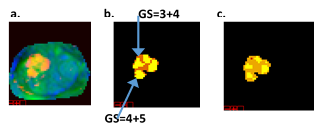Prostate cancer (PCa) is the most common malignancy and the leading cause of cancer-related death in men in the United States. Gleason Score (GS) is a validated predictor of PCa disease progression, mortality, and outcome. The GS, determined through biopsies, however, suffers from significant interobserver variability, potential for sampling error that can lead to false negatives or underestimate the severity of the disease, and can differ from those determined through radical prostatectomy and between immediate repeat biopsies. Automatically and non-invasively detecting the GS with high accuracy from diagnostic Magnetic Resonance Imaging (MRI), therefore, could significantly impact clinical decision making and treatment options for patients and spare them from invasive biopsies and their accompanying pain and possible complications. Specifically, non-invasive MRI tumor detection could help manage patients with high persistent prostate specific antigen levels (PSA) but negative needle biopsy. The MRI could also be a valuable adjunct for patients with low grade, low volume PCa who are undergoing active surveillance, and for monitoring of potential relapse or recurrence of PCa following therapy. PCa aggressiveness assessment by noninvasive and highly accurate means are needed to enhance the quality of patient care and improve outcomes.
